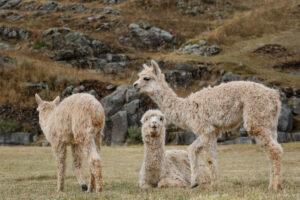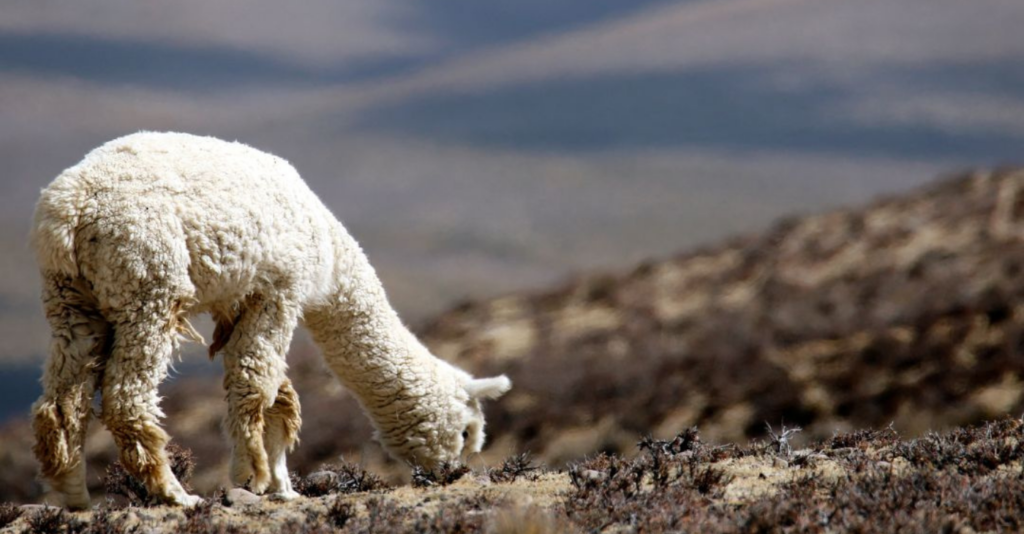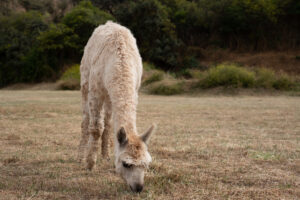Are you already a fan of alpaca and their marvellous wool or simply considering if it is the right choice for you? In this article we will share some of our favourite qualities that this unique fibre has to offer.
Alpacas have always been treasured for their fibre qualities that make their yarn so special it was once reserved only for the royalty. It is not only one of the finest and softest fibres in the world, but a faultless example of nature’s wisdom. The moment we first discovered this unique fibre, we formed an immediate emotional attachment and knew we had stumbled upon something truly special.
Alpaca wool is itch-free
Those of you who have experienced discomfort when it comes to more traditional wool, might find alpaca to be the perfect solution. Due to the fibre´s shorter microscopic scales and the absence of allergy-causing substances, high-quality alpaca wool is perceived as itch-free.
When the diameter of sheep fibre is measured 35-40 microns, then average alpaca wool measures 23-25 microns. Smaller micron-count equals less prickly wool, which is why baby alpaca wool, below 23 diameters, and royal alpaca wool with its finest 19 microns or less, have minimal prickle factor.
Alpacas produce the lowest amount of lanolin than any other wool yielding animal, which makes the fibre hypoallergenic and a safe choice for people who normally suffer from allergies and skin irritations. Being almost completely lanolin-free means that the wool can be considered dry instead of oily, holding less dust and microscopic environmental allergens.
This unique property also means alpaca yarn does not require harsh chemical processing, and your alpaca products do not need to be washed at high temperatures and strong detergents. However, it is important to keep in mind that we all perceive materials differently, depending on how sensitive our skin is.
Good for all-weather, all-season wear
The rare qualities we appreciate in alpaca wool are forged by the extraordinarily tough climate they live in. Alpacas come from the Andean highlands, where daily temperatures fluctuate up to 40 degrees – from -20C to + 20C. This unique environment has equipped the fibres with thermoregulating properties.
Alpaca wool contains microscopic air pockets which can efficiently trap and retain heat, making it an ideal insulator in a variety of weather conditions. These air pockets allow the fibre to adjust to your body’s temperature changes, by trapping your body warmth inside when temperatures drop and keeping you cool in the summer by dispersing the humidity outwards. Even more so, thanks to its breathability and moisture-wicking properties, this miracle fibre will help you stay dry and comfortable no matter the season.
Even though similar qualities are being replicated in synthetic yarns (such as acrylic, nylon and polyester), they can get cold and unpleasant on your skin, as they are not able to absorb enough moisture weight.
Not to mention, synthetic materials may not always be a good choice for our skin as most of them restrict our skin from breathing normally, resulting in discomfort and irritation. Alpacas and their prized fibre is simply so advanced, that humans cannot even begin to replicate it.

Water, stain and wind resistant
The rare structure of alpaca fibre offers yet another excellent benefit, which makes the material water-repellent. In comparison to other wool types, which can be considered water-proof due to lanolin, alpaca has the capability to evaporate water thanks to its small and hollow air pockets. This means that alpaca wool holds less weight in moisture and dries quicker even if it does get wet, increasing the stain resistance at the same time.
In most cases, the minuscule scales in alpaca fibre can completely repel stains or make it easy to clean up spills before the stains start to develop. Additionally, natural fibres contain keratin, which is famous for its antibacterial properties.
It helps to break down bacteria, which otherwise could cause unpleasant odours. This means that you do not have to wash your alpaca products as often or use harsh chemicals to do so, resulting in longer lasting clothes.
We all know how wind can make your time outside miserable. Besides being water-repellent and stain-resistant, alpaca wool provides excellent protection from the wind. Alpaca fibres provide a windproof barrier against the air to keep the animal safe and protected from unpredictable weather in their natural habitat.
After shearing and knitting the wool into garments, the wind resistant qualities remain depending on the wind conditions and the thickness of the knits.
Alpaca wool is biodegradable
One of the best ways to minimise the environmental pollution caused by textile industries is to be more aware about the different types of materials available on the market and opt for the environmentally-friendly options. Alpaca wool itself is biodegradable and a renewable source when it has not been treated with dyes, chemicals or different material blends.
This means that nature can break the fibre down and it is able to decompose naturally in about one to five years.
Alpaca wool is also recyclable, which is why we offer a selection of products made from recycled yarn, as it helps us to minimise textile waste, use less energy and water. Those attributes combined with its extremely smooth and silky feel make it an exclusive yet practical choice that is much appreciated in the sustainable fashion industry.
Our alpaca wool is ethically sourced exclusively from the highlands, where alpacas live freely with no other cultivation. Read more here.

